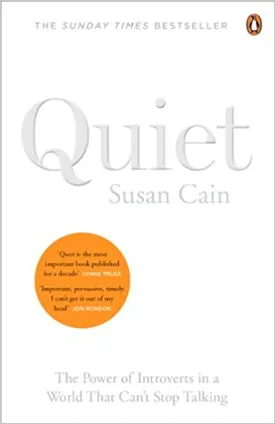Quiet: The Power of Introverts in a World That Can’t Stop Talking by Susan Cain
Susan Cain’s book Quiet: The Power of Introverts in a World That Can’t Stop Talking is a powerful book that examines the power that introverts have in a world that is growing increasingly louder and more extroverted. Written by a former corporate lawyer turned lecturer and leadership consultant, Quiet further examines the ways in which society has come to devalue introverted personality traits in a hyper outspoken and demonstrative global culture.
Cain makes it clear throughout Quiet that some of the most influential, creative and successful people of our time are introverts. Whether it’s the Nobel-prize winning novelist J.D. Salinger, the physicist Albert Einstein, or the accomplished Microsoft CEO Bill Gates, the book demonstrates that success is not reserved for the loudest and most extroverted in our society. In fact, Quiet explains that most of us are “ambiverts” which means that we are a combination of different personality traits.
One of the primary premises of Quiet is that introverts have a unique emotional intelligence, which is something that extroverts often lack. According to Cain, introverts tend to be more reflective in their thinking and are thus better-equipped to help others troubleshoot problems and make deeper emotional connections. She also explains that introverts are better because they spend their time listening to, rather than talking in a group, which is a skill that is often overlooked in our society.
In Quiet, Cain dispels a lot of myths around introverts and works to demonstrate that they can often be better leaders than extroverts. She explains that a key leadership trait of an introvert is to carefully listen to and solicit feedback from a team, which leads to more sound decision-making. Additionally, she explains that introverts are better suited for creative and innovative problem-solving because they have the mental space to come up with out of the box solutions and have the patience to weigh all available options.
Quiet also touches on the social and environmental factors that can lead to our society devaluing the traits of an introvert. Cain argues that we live in a culture where success is equated with speaking loudly and quickly, making bold statements, and having a wide network of people. As a result, in our current culture, it can often be difficult for introverts to thrive. This is particularly true in the professional world, where many companies prioritize outgoing and charismatic employees over those who may be more low-key and thoughtful.
Overall, Quiet is a powerful and insightful book. It examines the power that introverts have in society, despite the fact that it is often overlooked. With anecdotes and thoughtful conversations, Susan Cain provides valuable insight into the importance of recognizing and celebrating the qualities that introverts bring to the table. In this ever-changing, loud and noisy world, Quiet: The Power of Introverts in a World That Can’t Stop Talking is an important read for anyone who wants to better understand and appreciate the power of introverts in our society.

